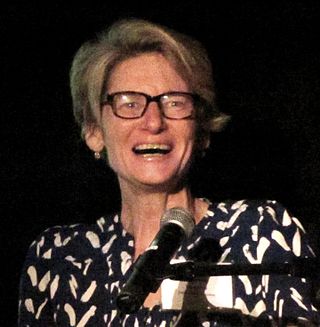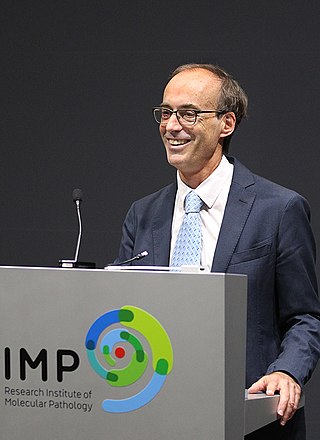Related Research Articles

Marc Wallace Kirschner is an American cell biologist and biochemist and the founding chair of the Department of Systems Biology at Harvard Medical School. He is known for major discoveries in cell and developmental biology related to the dynamics and function of the cytoskeleton, the regulation of the cell cycle, and the process of signaling in embryos, as well as the evolution of the vertebrate body plan. He is a leader in applying mathematical approaches to biology. He is the John Franklin Enders University Professor at Harvard University. In 2021 he was elected to the American Philosophical Society.

Bruce Michael Alberts is an American biochemist and the Chancellor’s Leadership Chair in Biochemistry and Biophysics for Science and Education, Emeritus at the University of California, San Francisco. He has done important work studying the protein complexes which enable chromosome replication when living cells divide. He is known as an original author of the "canonical, influential, and best-selling scientific textbook" Molecular Biology of the Cell, and as Editor-in-Chief of Science magazine.
Lawrence S.B. Goldstein is a professor of cellular and molecular medicine at University of California, San Diego and investigator with the Howard Hughes Medical Institute. He receives grant funding from the NIH, the Johns Hopkins ALS Center, the HighQ Foundation, and the California Institute for Regenerative Medicine. In 2020 he was elected to the National Academy of Sciences.
The American Society for Cell Biology (ASCB) is a professional society that was founded in 1960.
The E.B. Wilson Medal is the American Society for Cell Biology's highest honor for science and is presented at the Annual Meeting of the Society for significant and far-reaching contributions to cell biology over the course of a career. It is named after Edmund Beecher Wilson.
This lecture, named in memory of Keith R. Porter, is presented to an eminent cell biologist each year at the ASCB Annual Meeting. The ASCB Program Committee and the ASCB President recommend the Porter Lecturer to the Porter Endowment each year.

Eva Nogales is a Spanish-American biophysicist at the Lawrence Berkeley National Laboratory and a professor at the University of California, Berkeley, where she served as head of the Division of Biochemistry, Biophysics and Structural Biology of the Department of Molecular and Cell Biology (2015–2020). She is a Howard Hughes Medical Institute investigator.
The Federation of American Societies for Experimental Biology (FASEB), based in Rockville, Maryland, is a non-profit organization of scientific societies in the United States. With a focus on the biological and biomedical sciences, the federation represents scientists in such fields as anatomy, physiology, immunology, biochemistry, molecular biology, toxicology, genetics, and nutrition.

Elizabeth Marincola is the Senior Advisor for Communications and Advocacy at the African Academy of Sciences and is responsible for AAS Open Research, the Academy’s publishing platform. She has advocated for increased government resources dedicated to science and improved public education in science, and is an advocate of open access to the scientific literature, open scholarship and advancing research communication. Her 2013 TEDMED talk addresses many issues facing science, technology and medicine (STM) publishers, and she has advocated for quality research in Africa and why it is important. She also serves as an Ambassador for the European Science Foundation's Plan S.

Tom Abraham Rapoport is a German-American cell biologist who studies protein transport in cells. Currently, he is a professor at Harvard Medical School and a Howard Hughes Medical Institute investigator. Born in Cincinnati, Ohio, he grew up in East Germany. In 1995 he accepted an offer to become a professor at Harvard Medical School. In 1997 he became an investigator of the Howard Hughes Medical Institute. He is a member of the American and German National Academies of Science.

Anthony Arie Hyman is a British scientist and director at the Max Planck Institute of Molecular Cell Biology and Genetics.

Ronald David Vale ForMemRS is an American biochemist and cell biologist. He is a professor at the Department of Cellular and Molecular Pharmacology, University of California, San Francisco. His research is focused on motor proteins, particularly kinesin and dynein. He was awarded the Canada Gairdner International Award for Biomedical Research in 2019, the Shaw Prize in Life Science and Medicine in 2017 together with Ian Gibbons, and the Albert Lasker Award for Basic Medical Research in 2012 alongside Michael Sheetz and James Spudich. He is a fellow of the American Academy of Arts and Sciences and a member of the National Academy of Sciences. He was the president of the American Society for Cell Biology in 2012. He has also been an investigator at the Howard Hughes Medical Institute since 1995. In 2019, Vale was named executive director of the Janelia Research Campus and a vice president of HHMI, his appointment began in early 2020.
Michael Patrick Sheetz is a cell biologist, a pioneer of mechanobiology and biomechanics, and a key contributor to the discovery of kinesin. He serves as the Robert A. Welch Distinguished University Chair in Chemistry at the University of Texas Medical Branch, Galveston, the department of biochemistry and molecular biology. He is the William R. Kenan, Jr. Professor Emeritus of Cell Biology at Columbia University, former distinguished professor and the founding director of the Mechanobiology Institute at the National University of Singapore, and former professor at Washington University in St. Louis and Duke University.

Lynne Elizabeth Maquat is an American biochemist and molecular biologist whose research focuses on the cellular mechanisms of human disease. She is an elected member of the American Academy of Arts and Sciences, the National Academy of Sciences and the National Academy of Medicine. She currently holds the J. Lowell Orbison Endowed Chair and is a professor of biochemistry and biophysics, pediatrics and of oncology at the University of Rochester Medical Center. Professor Maquat is also Founding Director of the Center for RNA Biology and Founding Chair of Graduate Women in Science at the University of Rochester.
Michael W. Berns was an American biologist who was a professor of surgery and cell biology at the University of California, Irvine (UCI), and an adjunct professor of bioengineering at the University of California, San Diego. Berns was a founder of the first Laser Microbeam Program (LAMP), the Beckman Laser Institute, the UCI Center for Biomedical Engineering, and the UCI Photonics Incubator.
Jessica Polka is a biochemist and the Executive Director of ASAPbio, a non-profit initiative promoting innovation and transparency via preprints and open peer review. She was one of the organizers of a recent meeting they held on scholarly communication.

Rebecca W. Heald is an American professor of cell and developmental biology. She is currently a Professor in the Department of Molecular & Cell Biology at the University of California, Berkeley. In May 2019, she was elected to the National Academy of Sciences. She has published over 90 research articles in peer reviewed journals.
Trisha Nell Davis is an American biochemist, the current Earl Davie/ZymoGenetics Chair of the Department of Biochemistry at the University of Washington. Her early research focused on Calmodulin, though the primary focus of her lab has since shifted to the molecular machinery of cell division in budding yeast, especially the microtubule organizing centers and the kinetochores.
Renato J. Aguilera is an American biologist specializing in immunology. He is a professor of biological sciences at the University of Texas at El Paso and director of the Research Infrastructure Core and the Cellular Characterization and Biorepository Unit of the university's Border Biomedical Research Center. His research focuses on anti-cancer drug discovery. He has been recognized for his mentoring work and promoting inclusion of ethnic minorities in education and research. He holds two patents on mammalian DNAse II and on the anticancer drug pyronaridine (PND). He also has over 70 research publications on a variety of research areas.

Erika L F. Holzbaur is an American biologist who is the William Maul Measey Professor of Physiology at University of Pennsylvania Perelman School of Medicine. Her research considers the dynamics of organelle motility along cytoskeleton of cells. She is particularly interested in the molecular mechanisms that underpin neurodegenerative diseases.
References
- ↑ "Public service Award". The American Society for Cell Biology. Retrieved 9 February 2020.